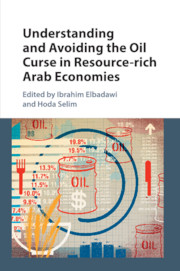Refine listing
Actions for selected content:
1211 results in Ebooks in petroleum sciences
11 - The Institutional Curse of Natural Resources in the Arab World1
-
-
- Book:
- Understanding and Avoiding the Oil Curse in Resource-rich Arab Economies
- Published online:
- 05 July 2016
- Print publication:
- 14 July 2016, pp 322-372
-
- Chapter
- Export citation
Contributors
-
- Book:
- Understanding and Avoiding the Oil Curse in Resource-rich Arab Economies
- Published online:
- 05 July 2016
- Print publication:
- 14 July 2016, pp xvii-xvii
-
- Chapter
- Export citation
Figures
-
- Book:
- Understanding and Avoiding the Oil Curse in Resource-rich Arab Economies
- Published online:
- 05 July 2016
- Print publication:
- 14 July 2016, pp vii-xi
-
- Chapter
- Export citation
Index
-
- Book:
- Understanding and Avoiding the Oil Curse in Resource-rich Arab Economies
- Published online:
- 05 July 2016
- Print publication:
- 14 July 2016, pp 461-474
-
- Chapter
- Export citation
Appendix B: - Variables Description
- from 11 - The Institutional Curse of Natural Resources in the Arab World1
-
- Book:
- Understanding and Avoiding the Oil Curse in Resource-rich Arab Economies
- Published online:
- 05 July 2016
- Print publication:
- 14 July 2016, pp 368-372
-
- Chapter
- Export citation
Acknowledgments
-
- Book:
- Understanding and Avoiding the Oil Curse in Resource-rich Arab Economies
- Published online:
- 05 July 2016
- Print publication:
- 14 July 2016, pp xxi-xxii
-
- Chapter
- Export citation
7 - Resource Rents, Political Institutions and Economic Growth*
-
-
- Book:
- Understanding and Avoiding the Oil Curse in Resource-rich Arab Economies
- Published online:
- 05 July 2016
- Print publication:
- 14 July 2016, pp 187-224
-
- Chapter
- Export citation
Appendix A: - Definitions and Sources of Variables Used in Regression Analysis
- from 7 - Resource Rents, Political Institutions and Economic Growth*
-
- Book:
- Understanding and Avoiding the Oil Curse in Resource-rich Arab Economies
- Published online:
- 05 July 2016
- Print publication:
- 14 July 2016, pp 219-219
-
- Chapter
- Export citation
Tables
-
- Book:
- Understanding and Avoiding the Oil Curse in Resource-rich Arab Economies
- Published online:
- 05 July 2016
- Print publication:
- 14 July 2016, pp xii-xvi
-
- Chapter
- Export citation
Contents
-
- Book:
- Understanding and Avoiding the Oil Curse in Resource-rich Arab Economies
- Published online:
- 05 July 2016
- Print publication:
- 14 July 2016, pp v-vi
-
- Chapter
- Export citation
10 - Labor Market Heterogeneity and Optimal Exchange Rate Regimes in Resource-rich Arab Countries
-
-
- Book:
- Understanding and Avoiding the Oil Curse in Resource-rich Arab Economies
- Published online:
- 05 July 2016
- Print publication:
- 14 July 2016, pp 301-321
-
- Chapter
- Export citation
Appendix A: - Definitions and Sources of Variables Used in Regression Analysis
- from 3 - Real Exchange Rates and Export Performance in Oil-dependent Arab Economies*
-
- Book:
- Understanding and Avoiding the Oil Curse in Resource-rich Arab Economies
- Published online:
- 05 July 2016
- Print publication:
- 14 July 2016, pp 72-73
-
- Chapter
- Export citation
4 - Dutch Disease in the Services Sector
-
-
- Book:
- Understanding and Avoiding the Oil Curse in Resource-rich Arab Economies
- Published online:
- 05 July 2016
- Print publication:
- 14 July 2016, pp 82-102
-
- Chapter
- Export citation
Appendix B: - Sample of Countries
- from 7 - Resource Rents, Political Institutions and Economic Growth*
-
- Book:
- Understanding and Avoiding the Oil Curse in Resource-rich Arab Economies
- Published online:
- 05 July 2016
- Print publication:
- 14 July 2016, pp 220-224
-
- Chapter
- Export citation
8 - Fiscal Institutions in Resource-rich Economies
-
-
- Book:
- Understanding and Avoiding the Oil Curse in Resource-rich Arab Economies
- Published online:
- 05 July 2016
- Print publication:
- 14 July 2016, pp 225-283
-
- Chapter
- Export citation
13 - Understanding and Avoiding the Oil Curse in Sudan
-
-
- Book:
- Understanding and Avoiding the Oil Curse in Resource-rich Arab Economies
- Published online:
- 05 July 2016
- Print publication:
- 14 July 2016, pp 421-460
-
- Chapter
- Export citation
6 - The Oil Curse and Labor Markets
-
-
- Book:
- Understanding and Avoiding the Oil Curse in Resource-rich Arab Economies
- Published online:
- 05 July 2016
- Print publication:
- 14 July 2016, pp 149-186
-
- Chapter
- Export citation
12 - Has the UAE Escaped the Oil Curse?
-
-
- Book:
- Understanding and Avoiding the Oil Curse in Resource-rich Arab Economies
- Published online:
- 05 July 2016
- Print publication:
- 14 July 2016, pp 373-420
-
- Chapter
- Export citation
2 - The Global Impact of the Systemic Economies and MENA Business Cycles1
-
-
- Book:
- Understanding and Avoiding the Oil Curse in Resource-rich Arab Economies
- Published online:
- 05 July 2016
- Print publication:
- 14 July 2016, pp 16-43
-
- Chapter
- Export citation

Understanding and Avoiding the Oil Curse in Resource-rich Arab Economies
-
- Published online:
- 05 July 2016
- Print publication:
- 14 July 2016
